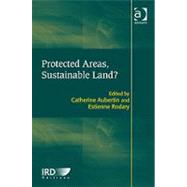Protected Areas, Sustainable Land?
, by Aubertin,Catherine- ISBN: 9781409412359 | 1409412350
- Cover: Hardcover
- Copyright: 8/28/2011
Protected areas, the main tool of nature conservation policies, are increasing on a worldwide scale. They are one of the main forms of environmental planning, and conservation institutions have increasing means at their disposal. At the same time, the goals of protected areas have become more diversified, with more stakeholders and complex institutional frameworks. The book gives an account of the extension and diversification of protected areas, attempting to determine whether these two processes constitute a breakdown in conservation policies. The book therefore analyses the various trends which seem fundamental to the future of protected areas: - The diversification of protected areas produces new spaces, where conservation is marginalized in favour of sustainable land management. - This is accompanied by the consolidation of the most protected areas, in which conservation actors resist strategies of diversification. - Local participation is no longer at the centre of nature conservation policies, but has given way to negotiation policies between different institutions with contradictory goals. A conflicting scene is thus emerging where narrative around cooperation and integration hide competition between different interests. The book shows how protected areas actually emerge as zones of divergent experimentations of sustainable development rather than lasting forms of integrative environmental management.







